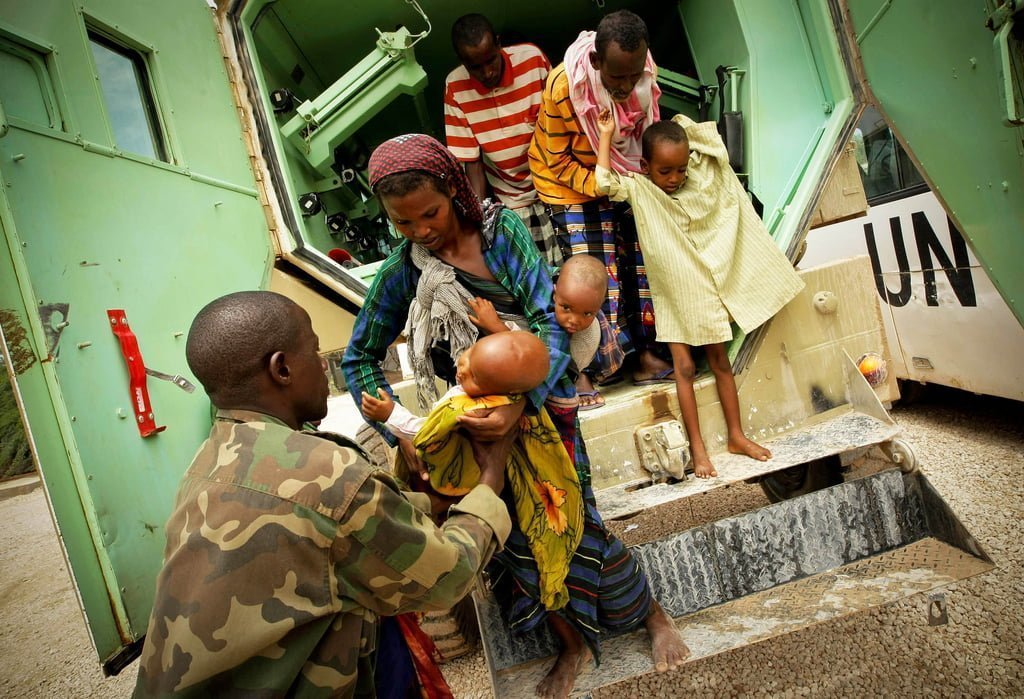Earlier this month, the United Nations announced that 20 million people are at risk of starving to death across the globe due to the wars and political crises in countries such as Yemen and South Sudan. This international humanitarian famine crisis is not the product of any “natural disaster” but is yet another symptom of the rotten capitalist system.
Earlier this month, the United Nations announced that 20 million people are at risk of starving to death, with the countries most affected being South Sudan, Nigeria, Yemen and Somalia. In order to tackle the crisis, the UN forecasts that it needs $5.4bn, with only a tiny fraction of that amount available at the moment.
The countries mentioned above are all unstable and plagued by conflicts: South Sudan has been in a civil war since 2013; in Nigeria, a key country for oil extraction, the government is fighting the Islamist group Boko Haram; Somalia has been 25 years without a functioning government; and Yemen has been in civil war since 2015. So the question arises, rather than being a “natural disaster”, is this famine crisis the product of capitalism’s wars and political crises? As the Financial Times says, “the short answer is yes”.
Yemen and Saudi Arabia
Yemen – the worst affected by famine, with an estimated 6.8 million people in a state of emergency and another 10.2 million in crisis – is the battlefield between a Saudi-led coalition and the Houthis, backed by Iran and Hezbollah. The reason for the conflict, in the words of the Saudi Ambassador to the US, is that “this is a war to protect the people of Yemen and its legitimate government from a group that is allied and supported by Iran and Hezbollah”, and “we are doing this to protect Yemen”. Under the pretence of “protecting” the people of Yemen, the Saudi coalition is undertaking a military campaign killing thousands of civilians by bombing schools, hospitals, and even funerals (!), helping to create the conditions for the largest humanitarian crisis since the UN was founded in 1945.
In order to tackle this huge task, major mass media outlets such as the BBC and the Guardian have been issuing appeals for people to donate money and goods, and encouraging volunteering either in Britain or abroad. The UK government have pledged to match “pound by pound the first £5 million donated by the public to the Disasters Emergency Committee’s appeal”, a coalition of the 13 leading UK aid agencies. As Priti Patel, the International Development Secretary, clarifies for us: “Britain has acted without hesitation” and “the government will double the difference Britons can make to the lives of children dying of hunger”. Even the Queen is apparently willing to chip in!
Putting aside these grandiloquent statements and looking at the reality, we see that the UK is second only to the US in terms of global arm sales. And who is the UK’s most important client? Saudi Arabia.
As Lenin explains in his Marxist classic the State and Revolution, the state is an institution created and controlled by the ruling class to alleviate the irreconcilable class antagonisms between the exploiters and the exploited. The UK government represents the interests of British big business and bankers – and their interests are the huge profits from arm sales and oil, which explains why Saudi Arabia is a key ally of Britain.
In the recent judicial review aiming to stop UK arms sales to Saudi Arabia, brought about by the Campaign Against the Arms Trade, James Eadie QC said, “the government should not have to set themselves up as auditors of armed conflict by friendly governments” when deciding whether there was a risk those governments might use British weapons to break the laws of war in the future. In other words, if there is profit to be made, there is nothing else that matters!
We clearly see then that all talk about “acting without hesitation”, “doubling the difference Britons can make” by Priti Patel is utterly repulsive, to say the least; the hypocrisy of these ladies and gentlemen is plain to see for everyone.
Poverty amidst plenty
The example above of Yemen demonstrates clearly that the current famine crisis is a product of the rotten system and the hypocritical establishment politicians who defend it. The same could be said of the crises in South Sudan, Nigeria, and Somalia, where famines are the product not of “natural disasters” but of fights between different sets of gangsters over the loot they have stolen from the masses.
Even if this international famine crisis is the worst since the UN was founded, death by malnutrition is not an isolated case; on the contrary, it is the norm under capitalism. According to the UN, 21,000 people die every day of hunger or hunger related causes – i.e. 1 every 4 seconds.
On the other hand, according to the FAO, one third of the food produced in the world for human consumption every year — approximately 1.3 billion tonnes — gets wasted. The main cause of this waste is the profit motive: the capitalists would rather leave food to rot than let prices fall; if food cannot be sold because people do not have any money, then the food simply becomes waste.
We therefore see under capitalism scarcity side-by-side with abundance; thousands of people dying of hunger alongside tonnes and tonnes of food wasted; misery and poverty for the masses next to luxury for the few.
Donations from the public are ultimately just a sticking plaster. To genuinely solve this humanitarian crisis requires us to draw the necessary conclusions. In this increasingly unstable and chaotic world of capitalist crisis, society will continue to go down the road of barbarism, with Syria being a clear example. Famines will continue to happen and at an increasing rate, affecting more and more innocent victims of the broken status quo. The only solution is to get to the root of the problem: to overthrow this decrepit system and replace it with a socialist society, democratically planned and run for the needs of the billions and not the profits of the billionaires.
Picture by UN Photo/Stuart Price, CC by-NC-ND 2.0






